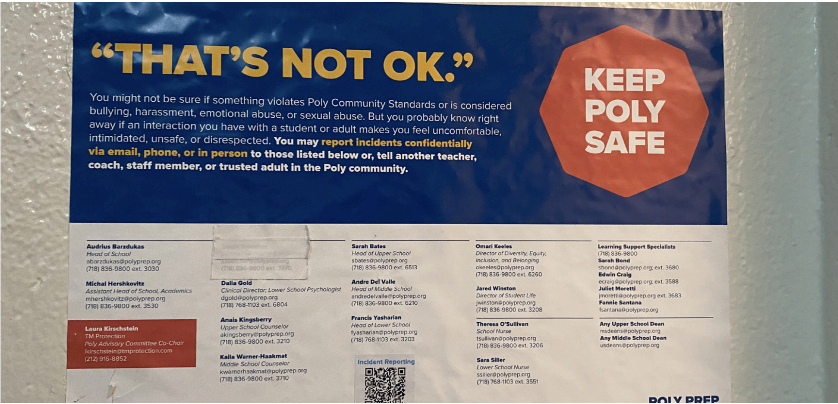A Student’s Guide to Reporting Harassment
How Does It Work?
A student starts the process by reporting an incident. That can be done in a couple of ways:
• Informing a trusted adult at Poly
• Filling out the incident form on Veracross
According to the official policy on Veracross, the following steps occur after the student reports: “The student’s dean and the person they reported to (if different than dean) will speak with the student to hear the details of their concerns. They will talk through the student’s desired outcome of the situation and clearly delineate next steps, which will include speaking with other students involved. The adults will protect the privacy and anonymity of the reporting student to the best of their ability. If there are disciplinary outcomes, we cannot share those with anyone outside of the immediate family of the student receiving the disciplinary action; however, the adults to whom the issue was first reported will inform the reporting student of when the investigation process is complete.”
Tips and Tricks From Someone Who Has Gone Through the Reporting Process
• Gather evidence. Photos, text messages, and just your first-hand story can help support your report. The school cannot take action without a victim’s story or other forms of evidence, so a rumor is not enough. If you want the perpetrator to be more likely to receive disciplinary action, you need tangible proof, or a first-hand account, that it happened
• Write down your story beforehand. Even if you are reporting through the incident form, write out what happened before the reporting meeting and share the document with your dean. It can help establish what happened, so the meeting doesn’t feel like
• Do it with others. It can be very scary to report an incident, so taking action with a support system can be helpful. Even just
having a friend being there with you can make it less intense. Additionally, if you know other students who have had the same or a related incident as you, report together. Not only does that make it less stressful for you, but it also provides more evidence and has a higher chance that disciplinary action will occur. There’s power in numbers!
If You Are Debating Whether to Report
Do it. It’s understandable why you wouldn’t want to, but it’s important to. There is a divide between the administration and the student body. It’s scary to put yourself out there, especially when there is not a guaranteed punishment for the perpetrator. But you need to. Every student should be able to go to school and not worry about being a victim of harassment and/or assault. You are experiencing something that doesn’t make you safe at school, and you deserve to not worry about your safety constantly. You don’t deserve this. Don’t hope it’ll magically end: If you say something, it can stop. With the tips and tricks outlined above, you will have a great shot at ending your harassment and/or assault while feeling comfortable. If we want to make Poly a better community, we need to report harassment and assault and show these incidents are not tolerated. an interrogation. Fewer questions for you, less scary for you. Reporting an incident can sometimes be more painful than the actual incident itself due to the amount of questioning, but recording the details beforehand lowers the chance of this happening.

























